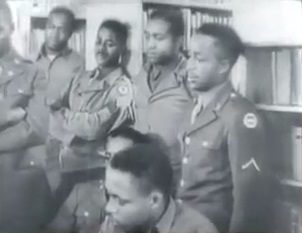The Remarkable Andrew
“An honest
man is the noblest work of God,” and if he’s in the government he
sees the Founding Fathers as living men who speak to him, and when the
administration covers up malfeasance by slandering him and jailing him and pronouncing
him insane, he sees General Andy Jackson, the hero of New Orleans, and Jesse
James, too, and a volunteer in the Revolutionary War who says, “well, I
never heard of you, either.”
The author is
Dalton Trumbo, it happens in Shale City, Colorado.
T.S. told his
readers in the New York Times it was all poppycock, “a fantasy
which doesn’t come off by a wide margin,” and that appears to be
the general appraisal among critics.
The Glass Key
You’re the
political boss, you like reform because of the candidate’s daughter, in
spite of the candidate’s unreformed son.
You crack down,
the mob objects.
The son dies, the
mob owns the paper, you’re indicted.
When push comes
to shove, the candidate confesses. The daughter marries your right-hand man.
“A good
picture of its type,” Variety said, taking note of The Great
McGinty (dir. Preston Sturges).
Tom Milne (Time
Out Film Guide) fancies a certain “teasing sexual ambiguity”.
The screenplay is
refined to an abstraction, for practical purposes,
therefore it lacks the mystery of Huston’s The Maltese Falcon,
according to some observers.
And yet you find
quotations from the film in Godard (Le Petit soldat) and Schlesinger (Marathon
Man) and Huston (The Mackintosh Man) and Cukor (Born Yesterday),
as well as the escape crashing down through a skylight.
The
Negro Soldier

Historical, from
the Boston Massacre to the Armistice. Informational,
training in the present emergency.
One of the great films
of the war, cogently describing the situation up to the minute. The author takes the pulpit of a Sunday high service to
deliver this sermon on fisticuffs and the Axis, a lady in the congregation interrupts
him to read a letter from her son, an Army lieutenant, describing his
experiences.
Bosley Crowther of the New
York Times saw its virtues acknowledged in a general release, but
concluded, “as an inspirational document, The
Negro Soldier has probably served well in those areas where such
stimulation of war-consciousness is required. It may
also convey a fuller respect for the Negro’s part in the war to civilian
audiences. However, it is to be noted that it very discreetly avoids the more
realistic race problems which are generally recognized today. It definitely
sugar-coats an issue which is broader than the Negro’s part in the war.
For this reason, it is questionable whether the purpose which it is intended
now to serve publicly may not be defeated by the film’s own limitations
and lacks.” Variety saw “a two-fisted plea for tolerance.”
Tulsa
The keystone is
the opening sequence, which culminates in the cattleman Lansing getting rubbed
out by a gusher. At the end of the whole film, you have been presented with a
treatise on conservation.
The stinging
truth, anyway the most salient point, was perceived by John Huston, who if one
is not mistaken matted a good deal of the oil-field fire into the climax of The Life and Times of Judge Roy Bean.
Tokyo Joe
The opening shot
is one of the greatest in films, the descent to Haneda.
Curtiz’ Casablanca
is the basis, Tokyo Joe’s from before the war.
Not the basis,
the premise. White Russian ex-wife, SCAP husband, Black Dragon plot hatched by
the Communists.
A little daughter
is the lever of love, on top of the general idea of recouping.
The Occupation forces
are with it, Nippon-America Air Transport comes to nothing, Baron Kimura and
his trio of war criminals flown out of Seoul are all taken care of.
And this time
there is the idea of reconciliation.
Chain Lightning
On the theory
that there are two ways to do anything, and the hard way is preferable.
Which is the
exact opposite of Halliwell’s “absolutely routine romance and
heroics.”
B-17s over
Germany, the new jet over the North Pole.
Storm Warning
Heisler’s magnetic powers of dramaturgy are the continually
vivifying source of this operatic sustained tour de force on a woman
(Ginger Rogers) who gets off the bus in Rock Point and walks right into a Klan killing, they’ve rolled up the sidewalks for the
occasion.
Her sister (Doris
Day) is married to one of them (Steve Cochran). The victim is a writer out to
expose the fraudulent cowardly organization as a moneygrubbers’ scheme,
he’s picked up for drunk driving and then dragged out of his cell and
shot.
Ronald Reagan is
the county prosecutor with a conspiracy of silence as big as any small town.
Hugh Sanders is the grand conspirator.
The Star
At the end of her
tether, the artist in Hollywood.
It was Russell
Rouse who fully documented such a case in The Oscar, and no critic would
brook the idea, whereas Heisler found a sympathetic audience of a kind in
Bosley Crowther, such a has-been this movie star, sad, very sad (Variety
thought it was all about Bette, her acting saved the film, etc.).
A producer says
those fatal words, “it won’t make a dime, but it’s a
beautiful picture.” The star can’t even
get a part in it, still she knows a thing or two, like
Margo Channing and Mrs. Skeffington.
Beachhead
Bougainville,
Marine diversionary attacks, confirmation of a naval minefield.
Memory is turned
to account after the very bitter lessons of Guadalcanal, between Enright’s
Gung Ho! and Huston’s Heaven Knows, Mr. Allison (with Farrow’s
Wake Island at the start of the
series).
H.H.T. (New York Times) thought Hawaii had the
best of it. “Jungle thriller,” says Halliwell’s Film Guide, “not too badly done.”